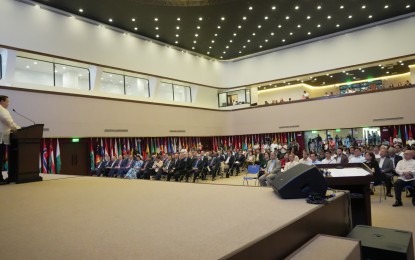
FOREIGN POLICY ADDRESS. Speaker Ferdinand Martin Romualdez delivers a speech during the 2nd Foreign Policy Address forum at the Bulwagang Apolinario Mabini of the Department of Foreign Affairs in Pasay City on Tuesday (April 23, 2024). He said the House of Representatives would focus on strengthening national security and enhancing economic development in the remaining session of the 19th Congress until June 6, 2025. (Photo courtesy of Speaker’s office)
MANILA – The House of Representatives would focus on strengthening national security and enhancing economic development in the remaining sessions of the 19th Congress until June 6, 2025.
Speaker Ferdinand Martin Romualdez said on Tuesday that the initiatives are critical in maintaining sovereignty and stability, enabling the country to pursue development goals without the shadow of external threats.
“As we embark on another session this April 29th, our legislative focus sharpens on the dual imperatives of national security and robust development. Recognizing that peace is the cornerstone of prosperity, we aim to enact laws that fortify our national defense and enhance our international security posture,” he said during the 2nd Foreign Policy Address (FPA) forum attended by diplomats and government officials at the Department of Foreign Affairs (DFA) in Pasay City.
He added that by strengthening peace and security, Congress could create an environment conducive to economic activities and development initiatives.
“These, in turn, contribute to further stabilizing our nation by reducing poverty, creating jobs, and improving living standards, which in turn diminishes the likelihood of social unrest. This virtuous cycle is fundamental to sustainable development and is a cornerstone of our legislative agenda,” he said.
At the same time, Romualdez said the House development agenda is expansive, targeting pivotal areas such as healthcare, education, and digital infrastructure.
In healthcare, he said the House is committed to expanding access and improving the quality of services, making healthcare “affordable and accessible to every Filipino.”
Initiatives in education, meanwhile, aim to create a more liberalized system that not only meets global standards but also equips the Filipino youth with the necessary skills to thrive in a globalized economy.
Additionally, he said the House is also doing its part in enhancing the country’s digital infrastructure to ensure that every Filipino can benefit from the digital revolution, bridging digital divides and fostering economic inclusivity.
Romualdez said the House is not just continuing its current path, but is accelerating efforts in exploring “innovative legislative measures” that promote technological advancement and environmental sustainability to ensure that the Philippines not only keeps pace with global trends but also sets a benchmark for innovation and responsible governance.
He invited all sectors “to engage with us” towards a peaceful and prosperous Philippines.
“Your insights, expertise, and participation are invaluable as we forge a path forward. Through collaborative efforts, we can build a future that reflects our highest aspirations and fulfills the promise of prosperity and peace for all Filipinos,” he said.
Economic ‘Cha-cha’
Romualdez took advantage of the occasion to push for another economic development advocacy -- removing restrictions on foreign investments in the constitution.
“We also recognize the need for more dynamic economic policies. Thus, we are advocating for amendments to specific sections of Articles XII, XIV, and XVI of the Philippine Constitution,” he said.
“Our extensive hearings on this matter have illuminated the broad benefits these amendments would bring, enabling more flexible, responsive governance. By enabling these adjustments, we can significantly enhance the Philippines' stature as an attractive destination for investments. More investments mean more resources, which support sustained economic growth,” he said.
He added that the changes, if effected, would also translate into more job opportunities, helping ensure that “Filipino families can thrive in an increasingly competitive world.”
Economic, social reforms
Romualdez told forum participants that the House of Representatives has put in place “significant reforms that have reshaped the economic and social landscape of the Philippines.”
“We enacted pivotal tax reforms designed to invigorate our economy by simplifying the tax code, encouraging investment, and ensuring a fairer system for all. These measures have laid the groundwork for a more robust economic framework, attracting foreign investments and stimulating local entrepreneurship,” he said.
The House commitment to infrastructural development is exemplified by the continuation of the "Build, Build, Build" program, he said.
International collaboration
On international relations, Romualdez cited the foreign policy mantra of President Ferdinand R. Marcos Jr. -- “the Philippines is a friend to all, enemy to none” -- and advocated collaboration among nations in solving the world’s problems.
“It is through collaborative efforts that we can address our common problems more swiftly and effectively. In the volatile, uncertain, and complex environment of today, a thoughtful response, rather than a hasty reaction, and extending a helping hand rather than retreating, are what wisdom dictates,” he said.
He also noted that under President Marcos’ leadership, the Philippines has taken significant steps to “rejuvenate and deepen” its international ties.
“Our diplomatic efforts were pivotal during the historic trilateral meeting between the United States, Japan, and the Philippines at the outset of April. This meeting underscored our strategic role in regional politics and security,” Romualdez said.
The FPA is a platform where lawmakers share their views with DFA personnel, members of the diplomatic corps, other government agencies, representatives from the academe and the business community, as well as think tanks, on any policy issue with foreign policy implications.
This year’s FPA focuses on “New Initiatives to Grow Business in the Philippines.” (PNA)
